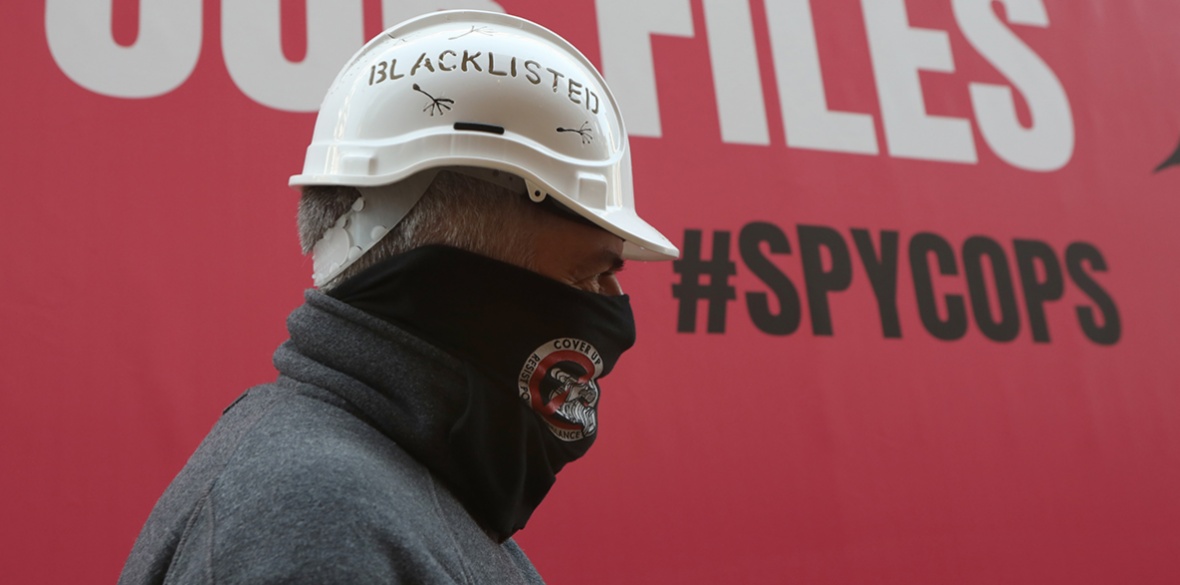This is the last article you can read this month
You can read more article this month
You can read more articles this month
Sorry your limit is up for this month
Reset on:
Please help support the Morning Star by subscribing here
by Bethany Rielly
A FORMER undercover officer told an inquiry today that he punched a campaigner as a form of “justice” after the man accused him of being a police spy.
The officer, who used the cover name Michael Scott, carried out the “cold and calculated” attack while infiltrating protest groups in the 1970s, including anti-apartheid and Irish solidarity organisations.
The spycop broke his little finger after hitting campaigner Gerry Lawless, who had accused him in a public meeting of the Troops Out Movement of being an undercover officer.
Giving evidence to the Undercover Policing Inquiry, Mr Scott said he felt that the punch was the “only sensible way” to deal with the accusation and maintain his cover.
The officer, who is now in his eighties, is one of 139 being investigated by the judge-led public inquiry into the infiltration of protest groups from 1968.
He told the inquiry that he decided to confront Lawless, who is now deceased, after the meeting.
Laughing as he recalled the events, Mr Scott said: “I went over there and confronted him about these false allegations. … I punched him on the nose, which seemed to be justice.
“He wasn’t injured especially, and I went to the next meeting because I couldn’t let him get away with that.”
Questioned about the incident by inquiry QC David Barr, the officer admitted that his actions were not in the heat of the moment but were part of a “cold and calculated” move.
“What made you think it was acceptable to commit a crime of violence against a member of the public during the course of your deployment?” Mr Barr asked.
Mr Scott replied: “Well it was acceptable to me.”
When pushed on it being a “crime of violence,” Mr Scott said: “I don’t think so, no.”
A lack of remorse for his actions while undercover was also apparent when he was asked about having stolen the identity of a man for his fake profile.
He was one of the first officers to assume the real identity of another person. The tactic became established practice in the unit later on, with officers required to pick out the identity of a deceased child from the public birth records to build fake profiles.
However, Mr Scott chose the identity of a man who was still alive. He said he did not consider that there were any risks to the real Michael Scott, despite the officer having opened a bank account in his name.
Asked whether he considered the impact of this on the real Michael Scott, he claimed: “It might have assisted him, because my credit score was good.”
During the officer’s deployment he was also convicted under his cover name for public order offences after being arrested at an anti-apartheid protest.
Mr Scott claimed that the conviction was “really of no consequence” to the real Michael Scott and was “not exactly a criminal record.”
The officer was arrested with 14 anti-apartheid campaigners in 1972 for trying to block the coach of the British rugby team in the hope that they’d miss their flight to South Africa.
The officer told the inquiry that neither the court nor the prosecution was informed that he was a police spy.
A memo shown to the inquiry revealed that the Met Police’s assistant chief commander knew that an undercover officer had been arrested and convicted under his cover name.
Mr Scott was also among several undercover officers who spied on the young Labour activist Peter Hain, who was at the time a prominent anti-apartheid campaigner.
This included reporting on meetings held in Mr Hain’s family home. Mr Scott admitted that his managers were concerned about the risk to their reputation if this fact was exposed to the public.
The inquiry continues.










